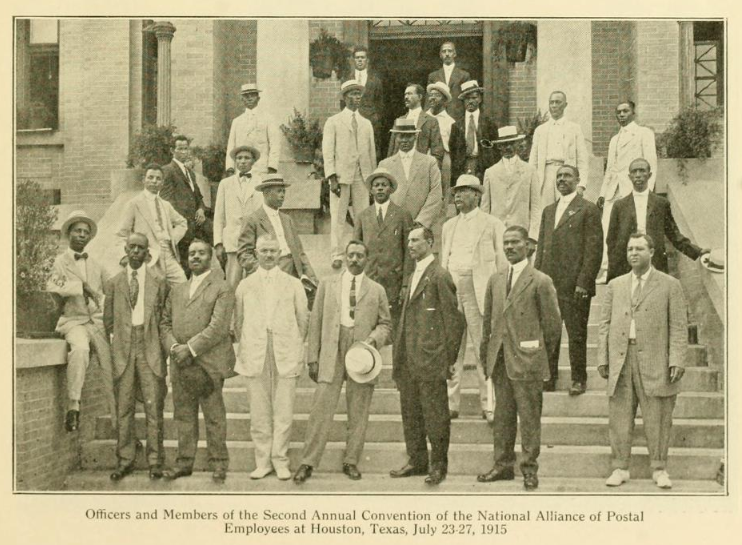Profile written by Paul Jennings
This Labor Day the Descendants of Olivewood are celebrating the life of Mason
Barnett Patten, educator, civil rights activist, and a founder of a national postal
workers union.
The son of enslaved parents, Patten was born in Polk County, Texas in 1871 and
attended Prairie View Normal Institute (now Prairie View A&M) before serving as
the principal of Huntsville’s first public school for Blacks. In 1899 Patten married
Pauline Garza of San Antonio, who was an educator as well.
The couple moved to Houston where Patten found work as a railroad postal clerk.
According to the Texas State Historical Association Handbook:
During the 1890s and early 1900s, the position of postal clerk could be
hazardous. Most of the mail cars were wooden and were dangerous in the
event of a train wreck. As a result, most postal clerks during this time who
were required to deliver and pick up mail were Black. When steel cars
became standard, an attempt was made to exclude Blacks from mail clerk
jobs.
In 1913 Patten and 16 other postal clerks from Houston formed the Progressive
Postal League to protest this threat to their jobs. Later that year members of the
Houston organization joined with similar groups throughout the South to form
the National Alliance of Postal Employees (now the National Alliance of Postal and
Federal Employees). Patten attended the founding convention and served two
terms as president of the new organization.

According to the union’s website, the National Alliance of Postal Workers was the
first industrial union (as opposed to a craft union) in the federal service. Although
its original membership was largely African-American, the union was open to all
postal employees regardless of race, sex, creed, or religion.
In addition to his activities in the trade union movement, Patten was a civil rights
activist and a charter member of the first NAACP chapter in Houston. In 1918 the
Houston Post reported that members of the local NAACP organization were
“urging every colored citizen to pay his or her poll tax” and noted that Patten was
a member of the group’s executive committee (Houston Post, Dec 30, 1918).
Tragically, Patten was killed on the job in a train accident outside Shreveport
Louisiana in February, 1920. His body was returned to Houston and he is buried at
Olivewood in lot 252 alongside his wife Pauline and their son Donovan.
Patten’s legacy of activism and political engagement continued in Houston even
after his passing. With the money paid out by the insurance company upon his
death, his family was able to send their daughter Thelma to Howard University
where she obtained her medical degree with a specialty in obstetrics and
gynecology. She returned to Houston in 1924 as Houston’s first African-American
female physician. Married to James H. Law in 1931, Thelma Patten Law delivered
hundreds of babies at Houston Negro Hospital (later renamed Riverside General
Hospital). Among her babies was one Barbara Jordan, who would go on to
represent Houston in the US House of Representatives.
For more information:
William C. Yancey, “Patten, Mason Barnett,” Handbook of Texas Online, accessed
August 16, 2022, https://www.tshaonline.org/handbook/entries/patten-mason-
barnett
Patricia Prather, “Law, Thelma Adele Patten,” Handbook of Texas Online,
accessed August 16, 2022, https://www.tshaonline.org/handbook/entries/law-
thelma-adele-patten
National Alliance of Postal and Federal Employees website,
https://www.napfe.com/about-napfe/history-of-napfe.html